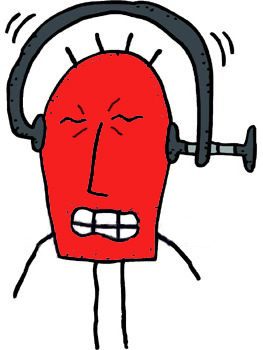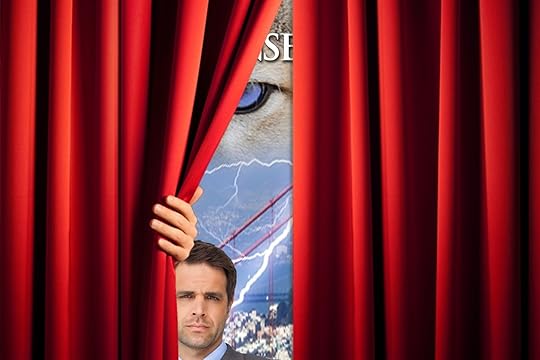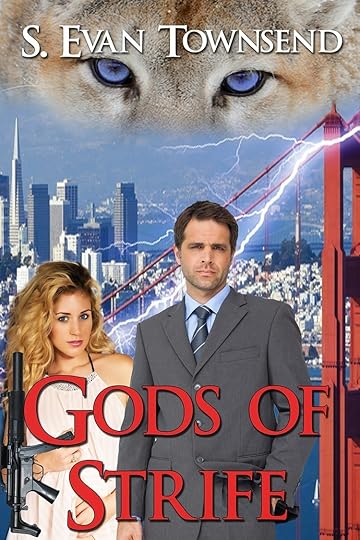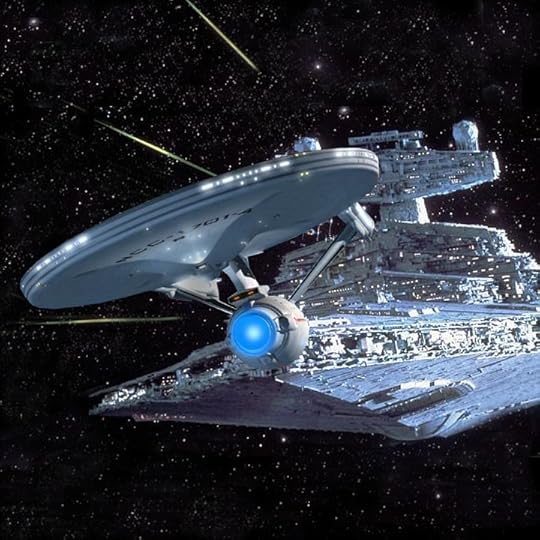S. Evan Townsend's Blog, page 111
April 21, 2014
Write, then Edit, then Edit Some More . . .
 I'm getting beta reads back on a science fiction novel I wrote called The Treasure of the Black Hole. Getting the beta reads done is the last step (almost) before submitting or publishing a novel. At least, that's my opinion.
I'm getting beta reads back on a science fiction novel I wrote called The Treasure of the Black Hole. Getting the beta reads done is the last step (almost) before submitting or publishing a novel. At least, that's my opinion.This is April. That novel was a NaNoWriMo project. That's five months almost since I finished the first draft to it being almost done. I say "almost" because I want to read through it one last time.
Why haven't I stuck a fork in it and called it done? Well, I'm about to, but, to paraphrase Orson Wells: I will submit nor publish no novel before its time.
In this blog I once said: "Your first draft will suck. Get over it and write the damn thing." And I stick by that. Write your first draft either as a NaNoWriMo project or just sit down and write. Just keep writing.
But when the first draft is finished, there is still a lot of work to do: months of work. The manuscript needs to be edited by you at least twice, three times is better. But before you edit it, you have to let it sit and the longer the better. I call this process "festering." The errors and bad writing become more blatant the longer it sits. I have a writer friend who says she won't go back to a manuscript until she's started working on something else. "I have to fall in love with something else so I can see it objectively." I'm not that extreme but I do wait a minimum of a week but, as I said, the longer the better.
Then I have my wife and (if she's willing) a friend proofread it. Proofreading is a different function from editing. If I were doing a venn diagram, proofreading would be inside of editing. But proofreading is more concentrating on typos, spelling errors, and punctuation while not looking at sentence structure or writing. Proofreading has its place in the editing process.
Then I have someone read it out loud to me. When I hear it and don't see it I pick up on things I don't when reading. I hear word repetitions, clunky construction, stilted dialogue, and writing that just isn't up to my standards. It works very well.
Then I let it sit again, and edit it again. Then I do beta reads with as many people as I can get (this is where your writers' group comes in handy; you are part of a writers' group, aren't you?). You want to get all the feedback you can because people see things you don't see. Or they have questions that make you realize you didn't explain something well enough.
Then, read though it one last time, and stick a fork in. There's a balance there. You don't want to tweak a manuscript for ten years. You have to, at some point, realize that it's good enough. Or great enough. You need to publish or submit it as is. Will there be a typo in it? Probably. Will there be a sentence that isn't absolutely beautifully written. Very likely. But you need, now, to submit or publish it.
Then start writing that next first draft (which I actually hope you started sometime during the editing process of the last manuscript). Because you need to just keep writing.
Published on April 21, 2014 05:00
April 18, 2014
Book Trailer: The Adept Series
The book trailer for the Adept Series is now live:
Learn more about the magical Adept Series on my webpage.
Learn more about the magical Adept Series on my webpage.
Published on April 18, 2014 10:10
April 15, 2014
Movie Review: 12 Years a Slave
 I watched
12 Years a Slave
last week and have spent the time since thinking about this powerful movie. There is probably no one in what is commonly referred to as "The West" (i.e., Western Europe, Canada, and the U.S.) who needs to be convinced that slavery is a very very bad thing. But, not 300 years ago, it was ubiquitous and the victims weren't all from Africa (the word "slave" comes from "Slavic" as in the peoples of south-eastern Europe, where for a long time Europeans got a lot of their slaves). For about the last 100 years that there was slavery in the West, it coincided with a building consensus that it was very wrong. The barbarity of slavery collided with the idea that "all men are created equal."
I watched
12 Years a Slave
last week and have spent the time since thinking about this powerful movie. There is probably no one in what is commonly referred to as "The West" (i.e., Western Europe, Canada, and the U.S.) who needs to be convinced that slavery is a very very bad thing. But, not 300 years ago, it was ubiquitous and the victims weren't all from Africa (the word "slave" comes from "Slavic" as in the peoples of south-eastern Europe, where for a long time Europeans got a lot of their slaves). For about the last 100 years that there was slavery in the West, it coincided with a building consensus that it was very wrong. The barbarity of slavery collided with the idea that "all men are created equal."The movie, 12 Years a Slave, is based on an autobiographical novel about a free black man who was sold into slavery unjustly and accused of being a run-away slave. In his twelve years as a slave he had owners who were reasonably good to their slaves. But his last owner was a man who took out his insecurities on his slaves, including one beautiful female slave he regularly raped.
Like owners, overseers (the white plantation employees who supervised the slaves) were both good to the slaves or cruel. Imagine all the bad bosses you had having the power of life and death over you.
The movie is bookmarked by a brutal beginning when Solomon Northup, the free black man, is punished for being a run-away, and an even more brutal climax. This movie is well made, has many fine actors and performances, and shows that, in the words of Roy Batty from Blade Runner, "Quite an experience to live in fear, isn't it? That's what it is to be a slave." You can see the fear every slave feels: fear of saying or doing the wrong thing which will bring them a flogging, whipping, or lynching.
12 Years a Slave does a better job than any other movie I've seen about what it was like to be a slave in the antebellum South. And when you realize you need to look away from the screen at the reality of it, you realize just how bad slavery was. And is, as there are still places where it is practiced, ironically, mostly in Africa.
Published on April 15, 2014 12:32
April 14, 2014
Depression: An Insider's Perspective.
 I am type-2 bipolar with dysthymia. I don't make a secret about it and I am not ashamed of it (I'll get into reasons why in a bit). I am on three medications to control both the bi-polar and the dysthymia (because lithium didn't work for me; or rather, it worked too well).
I am type-2 bipolar with dysthymia. I don't make a secret about it and I am not ashamed of it (I'll get into reasons why in a bit). I am on three medications to control both the bi-polar and the dysthymia (because lithium didn't work for me; or rather, it worked too well).Dysthymia a type of depression defined as depression that lasts two or more years. It can be slightly depressed with episodes of major depression, or very depressed. With my bipolar my dysthymia was major depression occasionally interrupted by mania.
Today I want to talk about depression because I think it is very misunderstood by a lot of people. And if you are a writer and your character is depressed, you'll want to understand that character. So today I shall bare my soul. Well, sort of.
Everyone get's a little "blue" every now and then. Your girlfriend breaks up with you. Your job sucks. But it passes after a few weeks or even a couple of months. This is "situational depression" where you are depressed for some good reason. There is a slight risk of it turning into major depression, especially if it lasts longer than two months. But mostly people get over it and get on with their lives. It's a natural response to a sad situation.
Then there are people such as me. I'm depressed nearly all the time (without meds). I called it "floating depression" because it seemed there was this dark cloud hovering over me ready to rain on my parade at any time. I could be in a happy, joyous occasion and feel sad. This is not due to a character fault, a personality weakness. It's due to the chemistry in my brain. I probably inherited this chemistry judging by the mental illness in my family history.
This is like being type-I diabetic or having epilepsy. It is nothing to be ashamed of. It is not the fault of the person that they are depressed. Telling them not to be depressed is like telling a diabetic to not be diabetic. It won't happen. Like the diabetic needs treatment, so does the person who is depressed. Someone once asked me with horror in their voice, "Aren't you dependent on your drugs?" and I said "Yes, very much so, just like a diabetic is dependent on insulin." Should the diabetic feel guilty about taking insulin? They why should I feel shame for being "dependent" or my psychotropic drugs?
But what does depression feel like? It ranges from feeling "blue" constantly to feeling life is completely not worth it and you might as well end it. I used to wake up every morning contemplating killing myself. And the side benefit was, I wouldn't have to go to work. I'm not sure this is because I was depressed, but I would cry at movies. Forrest Gump made me ball like a baby at the end.
I guess to know how depression feels, imagine being your saddest for not minutes, hours, or even days, but years. No matter what nice or wonderful things happen to you, you are still sad underneath. It's as if you live in the sunshine but shadowy hands are constantly dragging you down into a river of sadness. And there seems to be no escape.
Depression is a serious mental disorder that you need to treat if you experience it for more than a couple of weeks. I'm not a doctor nor a psychiatrist, just a guy who knows what it likes to be depressed constantly. I am so happy I got the meds that keep me from being depressed and keep me from having manic episodes. Maybe later I'll write about what being manic is like.
Published on April 14, 2014 05:00
April 11, 2014
Clean Cars
 Years ago I was in Anchorage Alaska. It was a beautiful July day with blue sky and nary a cloud. You could see the amazing mountains that surround this city almost as if they were close enough to touch. And every single car I saw was filthy dirty. Not a little dusty, not a few bugs on it, but filthy. And I thought, "I should introduce these people to the concept of the car wash." Then, as we drove through the streets, I saw a car wash. It looked new and modern. Well, except for the weeds growing between the crack in the concrete and that the building was empty. It was obviously out of business.
Years ago I was in Anchorage Alaska. It was a beautiful July day with blue sky and nary a cloud. You could see the amazing mountains that surround this city almost as if they were close enough to touch. And every single car I saw was filthy dirty. Not a little dusty, not a few bugs on it, but filthy. And I thought, "I should introduce these people to the concept of the car wash." Then, as we drove through the streets, I saw a car wash. It looked new and modern. Well, except for the weeds growing between the crack in the concrete and that the building was empty. It was obviously out of business.So I asked my Alaska-born cousin, "Don't people wash their cars around here?" And she said with a laugh, "Alaskans don't care about clean cars." This much was obvious.
I do care about clean cars. I like to keep my cars clean. But where I live this is nearly impossible. In the winter there's mud from the dirt on the road mixing with snow mixing with the sand the county dumps to improve traction. Then the state sprays this brown goo deicer on the interstate. It's supposed to be better for the environment than road salt. I consider car washing to be part of car maintenance because you don't want those deicing chemicals eating your vehicle's skin. So I try to wash the car on a semi-regular basis in the winter.
In the summer we have bugs and dust. I tend to buy light-colored cars so the dust isn't immediately prevalent. But I did own a dark blue Camaro. I would wash it, drive it, wash it, drive it, etc.
But the biggest issue we have around here in the summer is bugs. For instance, on Wednesday I drove
 my car about 110 miles from Spokane to my house. When I left Spokane the car was pristine. There wasn't a speck of dirt on it. When I got home, the front was covered in bugs. And that's not the worst. Look at the picture at right. This was taken in August a few years ago. I left home with a clean car and drove 140 miles (round trip) and when I got home this is what the front of my car looked like. And most of those bugs were in the last 50 miles or so. The bugs were so thick at first I thought it was raining.
my car about 110 miles from Spokane to my house. When I left Spokane the car was pristine. There wasn't a speck of dirt on it. When I got home, the front was covered in bugs. And that's not the worst. Look at the picture at right. This was taken in August a few years ago. I left home with a clean car and drove 140 miles (round trip) and when I got home this is what the front of my car looked like. And most of those bugs were in the last 50 miles or so. The bugs were so thick at first I thought it was raining.So, you wash your car, drive it a bit, wash it, drive it a bit, etc. You can't keep a car clean here in central Washington State.
But I try. And for the three minutes it's clean and beautiful, it's worth it.
Published on April 11, 2014 08:00
April 10, 2014
Car Review: 2015 Audi A3 Sedan
 Yesterday I had to take my car into the dealer for some warranty work. They said they would need the car all day and since it was a 110 mile drive to the dealer I said I wanted a courtesy car so I could at least go do something. They agreed.
Yesterday I had to take my car into the dealer for some warranty work. They said they would need the car all day and since it was a 110 mile drive to the dealer I said I wanted a courtesy car so I could at least go do something. They agreed.I'd like to state that the auto dealer did a very good job on the work and I am very happy with their response.
But the courtesy car they gave me was a 2015 Audi A3 sedan. Yes, a 2015 model, just introduced into the US. According to Car and Driver (my source for all things automotive), Audi is hoping to use this car to attract younger buyers who, they hope, will get in the habit of buying Audis and then when they are older and have the means, move up to an A4 or A6 rather then a BMW or Mercedes-Benz.
But if this is the car that is suppose to lure young people to stick with Audi, I don't think they will be successful.
First of all, I could barely get into it. Now, yes, I am a big guy. But it wasn't my size that seemed to be the issue but my height. I put the seat all the way down and still my head hit the top of the door frame. I had to sort of wedge myself in, making sure my head was as close to the B-pillar (the pillar between the front and back doors) as possible, and still it seemed with each entry and exit I was scraping off hair I could not spare. But that could have just been me. Once inside the car I had plenty of room and was comfortable.
Driving the car was not what I would expect from a near $30,000 "near-luxury" vehicle. The 1.8L turbocharged 4-cylinder engine ran so rough I wondered if was a diesel (it wasn't, I checked the filler cap). It seriously sounded as if there was gravel in the cylinders grinding away. Engines are supposed to sound good, not like concrete mixers.
The throttle response was nothing nothing nothing OMG TOO FAST! It seemed the first few inches of throttle travel gave no response then the car leapt forward as if goosed by a cattle prod. I was sure people behind me at red lights thought I was sleeping when the light turned green but I was slowly pushing down the gas pedal so the car wouldn't rear-end the car in front of me.
The Continental tires were noisy, especially on concrete pavement. The trunk was small (it couldn't hold all of our Costco purchases) but, as I said, the interior was comfortable at least in the front seats.
I didn't get a chance to test its handling very much due to driving mostly on crowded city streets and the engine seemed capable to pull the car to speed on the freeway if you could stand the noise it made. But if someone asked me if they should buy this car, I'd say "no" simply for the engine noise and the throttle response.
Published on April 10, 2014 11:11
April 8, 2014
Book Trailer Gods of Strife
Published on April 08, 2014 07:00
April 7, 2014
Cover Reveal: Gods of Strife
 Today we are proud to reveal the cover of the next Adept Series novel,
Gods of Strife
. Set in 1976, this fourth book in the series features the same globe-hopping, historical, and exciting action as the previous books in the series. It will be released May 15, 2014 from World Castle Publishing.
Today we are proud to reveal the cover of the next Adept Series novel,
Gods of Strife
. Set in 1976, this fourth book in the series features the same globe-hopping, historical, and exciting action as the previous books in the series. It will be released May 15, 2014 from World Castle Publishing.They live among us. We know they are there. No government can control them; no authority can stop them. Some are evil. Some are good. All are powerful. They inhabit our myths and fairy tales. But what if they were real, the witches, wizards, and fairy godmothers? What if they were called "adepts" and an ancient evil stalks them?
An assassination attempt on the head of the American Meta Association guild sends adept Peter Branton looking for who wants him and his leader dead. Finding the beautiful, shape-shifting assassin leads him to his real enemy, an enemy that is much worse and much more dangerous: living gods of Atlantis. Branton must team with up with his would-be killer and a mysterious warrior to defeat the gods of strife that are intent on starting a war that could devastate all mankind.So without further ado, the cover of Gods of Strife:

See the trailer here.
Read an exciting excerpt here.
Published on April 07, 2014 05:00
April 3, 2014
Reality versus Fantasy
 Yesterday I did a review of the movie Gravity in which I excoriated the movie for scientific inaccuracy, especially when it comes to orbital dynamics.
Yesterday I did a review of the movie Gravity in which I excoriated the movie for scientific inaccuracy, especially when it comes to orbital dynamics.And then I started thinking: why do I care? I've watch Star Wars and Star Trek and hundreds of other science fiction movies that completely ignore science. And I don't feel the need to correct their science. Well, maybe if it's completely implausible. Like the scene in Star Trek: First Contact that's supposed to be in "zero gravity" and vacuum yet you can see gasses interacting with air and people move as if they are in gravity ("magnetic boots" are the supposed reason why). But I sort of shrug and go on. Why? Why did I care that Gravity had such bad science yet don't care that Star Trek does?
I think it's because Gravity was "real world" as in it was set in contemporary times and it involved places (Earth) and technology that exists. It was the real world. Star Wars is verging on fantasy (the creature living in the asteroid with creatures living inside it?) and Star Trek, at least before the J.J. Abrams versions, were at least marginally accurate and what wasn't accurate could usually be explained away by some technology that doesn't now exist. (I lost a lot of respect for Mr. Abrams when I learned he wrote the awful movie Armageddon which has laugh-out-loud science errors).
I think there's a lesson here for writers. You have to keep your audience in mind for how accurate you are gong to be on your research including science. In my novel Rock Killer I tried to be as scientifically accurate as I could because I knew the audience for that novel would expect it. Now I'm fair to middling with math (don't ask me to do calculus anymore) and sometimes I just don't think about everything that you have to think about. So what I'm saying is, there are probably science errors in Rock Killer. But I did my best to minimize them. In my work in progress that is currently at a beta reader, The Treasure of the Black Hole, I also did my best to minimize science errors even though it is not what I would call "hard science fiction" like Rock Killer.
In my Adept Series of novels I also tried to be very historically accurate (they are set in the past) and also scientifically accurate within my fantasy framework. Because it's a lot easier to check the historic record than calculate an orbit I knew I'd have lots of fact-checkers with those novels. Someone might read it who know the actual historic details. Again, that is because I was keeping my potential audience in mind.
How accurate to facts or science your novel is depends how who you are writing it for and what genre. But I think glaring scientific errors will be pretty much noticed by anybody. So unless it's a complete fantasy, you'd better get at least the basics correct.
Published on April 03, 2014 09:00
April 2, 2014
Movie Review: Gravity
 Last night I watched
Gravity
on Blu-ray. I'd like to start by saying this is a visually stunning movie and gives one a feeling of being in space, in orbit about the Earth. The performances by George Clooney and Sandra Bullock are very good, especially Bullock as you feel her fear, pathos, and final triumph.
Last night I watched
Gravity
on Blu-ray. I'd like to start by saying this is a visually stunning movie and gives one a feeling of being in space, in orbit about the Earth. The performances by George Clooney and Sandra Bullock are very good, especially Bullock as you feel her fear, pathos, and final triumph.But, while I won't recount every scientific and factual error in the movie (there's plenty of lists on the internet), I would like to say I have no idea why this movie was called Gravity. Except for the last few scenes, the filmmakers ignored gravity completely.
People think there's no gravity in space. If that were true then planets wouldn't orbit the sun and satellites (and space shuttles) wouldn't orbit the Earth. Nor would the Moon. There's lots of gravity in space and unless you're in the deep interstellar area between stars, there's enough you have to worry about it. That means when you are in orbit about the Earth you have to deal with Earth's gravitational field.
The space shuttle and the astronauts aboard it are being affected by gravity. To say they aren't is to say a man jumping off the Empire State Building isn't being affected by gravity. Both that suicidal man and the astronauts are in "free fall." That is because an orbit is sort of like Douglas Adams' description of flying: throw yourself at the ground and miss. An object in orbit about the Earth is falling toward the surface of the Earth with whatever acceleration gravity gives it at its altitude. But it's forward speed is such that as it falls one meter toward the surface, the surface of the Earth is one meter farther away due to the curvature of the Earth. The object is falling toward the Earth but never hits it because of the curvature of the Earth. (This is true for all orbits including the Earth's orbit around the Sun.)
In the movie the astronauts are working on the Hubble Space Telescope (HST) which orbits at 559 kilometers. If you built a ladder to the altitude the the HST orbits at, you would be able to stand on it. In fact, the gravity you would feel would be about 85% of the gravity you feel at the surface of the Earth (8.29 meters per second squared on the ladder versus 9.81 meters per second squared on the surface). And the astronauts would fly by, floating around the cabin of the shuttle, because they are in free fall, but also in orbit. So, yes, Virginia, there is gravity in space. Which the filmmakers pretty much ignore.
In the movie there are scenes where astronauts move a long distance between points in orbit. But they completely ignore orbital mechanics as if there's no gravity. George Clooney's character uses a Manned Maneuvering Unit (MMU) to rendezvous with a distance object. He sort of aims himself at it and accelerates (at least he didn't accelerate the whole way). But in orbit, in order to rendezvous with something, you have to change your orbit to either speed up or slow down your velocity, then change your orbit again to match the orbit of the object you're trying to reach. If Clooney accelerated so that he slowed down (i.e., accelerated in the direction opposite his velocity vector), this would put him in a lower orbit and his orbital velocity would increase (yes, this is counter-intuitive). If he accelerated so that he sped up, this would put him in a higher orbit, he would slow down, and maybe the object he was trying to reach would catch up with him. All of this was ignored in the movie as if there were no gravity. And that was the biggest problem I had with the movie.
And then there's a scene that makes zero scientific sense when some something pulls George Clooney's character away when he had zero velocity relative to his objective and therefore had zero momentum (because momentum is mass multiplied by velocity and his velocity was zero) yet when he unhooks himself, he flies away as if some unseen force was pulling on him. And since he moves away from the Earth, it wouldn't be gravity.
Plus I don't think an MMU has as much fuel as portrayed in the film. Also, I really doubt NASA would let an astronaut zip around the shuttle, the Hubble Space Telescope, and other astronauts as Clooney is shown doing at the beginning of the movie. Even if it was visually fun to watch.
But, with all that long dissertation, it was a good movie. With better science, it could have been a great movie.
Published on April 02, 2014 11:11



